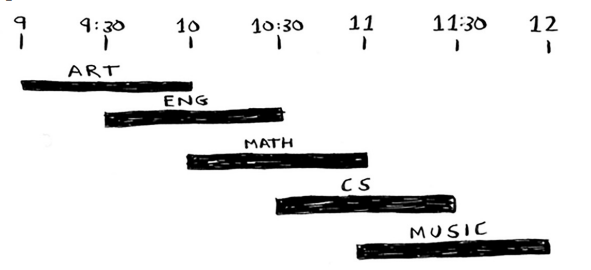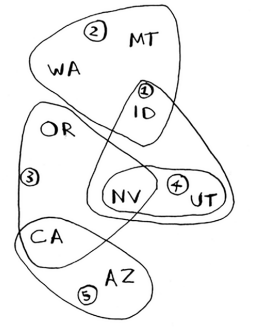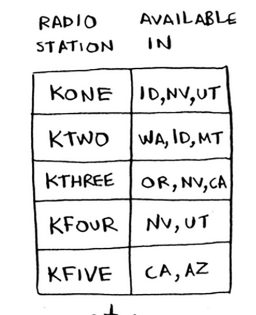Greedy Algorithms
A greedy algorithm is simple: at each step, pick the most optimal move without considering future consequences. While greedy algorithms are efficient, they don’t always produce the best solution.
Example 1: Scheduling Classes

Problem asks us to hold as many classes as possible in this classroom.
A Greedy approach to solve this is -
- Select the class that ends earliest
- Pick next class that starts after previous class ends
- Repeat until no more classes can fit
Example 2: Knapsack problem
You have a knapsack that can hold 35 kg. A shop offers the following items:
| Item | Price ($) | Weight (kg) |
|---|---|---|
| Stereo | 3000 | 30 |
| Laptop | 2000 | 20 |
| Guitar | 1500 | 15 |
Greedy approach -
- Pick heaviest valuable item first.
- Repeat until sack is full
Note - Check how here Greedy approach fails. If we pick 30KG, we only get $3000, but if we would have picked Laptop(20KG) and Guitar(15KG) - $3500
Example 3: The Set Covering Problem


Each station covers a region, and there’s overlap. How do you figure out the smallest set of stations you can play on to cover all 50 states ?
Solution 1: Brute Force -
Generate all possible subsets of stations (2^n combinations). Choose smallest subset that covers all states. Time complexity it’ll take is O(2^n) so too slow for large datasets.
Solution 2: Greedy -
- Pick the station that covers the most uncovered states.
- Repeat until all the states are covered
Time complexity - O(n^2)
Implementation -
import java.util.*;
public class StationSelection {
public static void main(String[] args) {
Set<String> statesNeeded = new HashSet<>(List.of("mt", "wa", "or", "id", "nv", "ut", "ca", "az"));
Map<String, Set<String>> stations = Map.of(
"kone", Set.of("id", "nv", "ut"),
"ktwo", Set.of("wa", "id", "mt"),
"kthree", Set.of("or", "nv", "ca"),
"kfour", Set.of("nv", "ut"),
"kfive", Set.of("ca", "az")
);
Set<String> finalStations = new HashSet<>();
while (!statesNeeded.isEmpty()) {
String bestStation = null;
Set<String> statesCovered = new HashSet<>();
for (Map.Entry<String, Set<String>> entry : stations.entrySet()) {
Set<String> covered = new HashSet<>(statesNeeded);
covered.retainAll(entry.getValue()); // retain only the elements that are common between covered and the set of states covered by the current station
if (covered.size() > statesCovered.size()) {
bestStation = entry.getKey();
statesCovered = covered;
}
}
statesNeeded.removeAll(statesCovered);
finalStations.add(bestStation);
}
System.out.println("Final selected stations: " + finalStations);
}
}